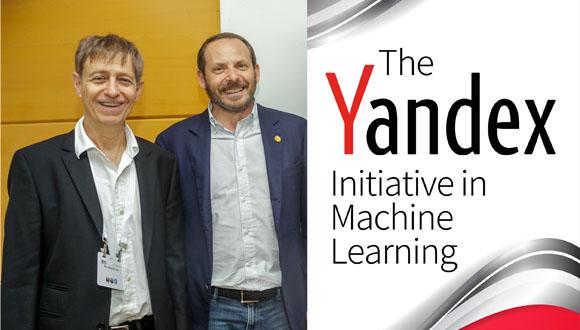The Yandex Initiative for Machine Learning
Inauguration Ceremony - May 2018 - Photo Album
Can we build machines that are as intelligent as humans, and that can learn like humans do?
Machine learning is a field in computer science that asks this question, and develops the corresponding theory and algorithms towards achieving this goal.
In recent years, machine learning has been revolutionized by the use of “Artificial Neural Networks” (also known as deep learning). State of the art has been dramatically improved in applications like image recognition and speech recognition. However, we are still very far from building machines that can understand text and images like humans do, converse in natural languages, and from building robots that execute complex motor behaviour.
These are exciting times for machine learning, and it has become one of the most active and intellectually engaging fields within computer science.
Tel Aviv University is home to many world class researchers who cover all aspects of machine learning: from learning theory, to natural language processing, machine vision, data mining, robotics and deep learning.
Our goal is not only to do machine learning research at the highest level, but to teach students (undergraduate and graduates) machine learning, such that they can become the future leaders in industry and academia.
The Yandex Initiative in Machine Learning is a unique program, based on collaboration between the Tel Aviv University, and Yandex, the largest technology company in Russia, and one of the pioneers of Internet search technology. Yandex has also been involved in machine learning and data-science education for many years, via its Yandex School of Data Analysis (YSDA) and its MSc programs.
The Yandex Initiative will help drive Machine Learning in Tel Aviv University in multiple aspects. For example by funding ML related research, supporting teaching staff and resources in ML, and supporting the Yandex Distinguished Lecture Series, where the world’s leading ML experts will visit Tel Aviv and talk about their research,.
As part of the initiative, the School of Computer Science offers an extensive program in ML expressed in a cluster of Machine Learning courses (see yedion), that will provide students with the most uptodate expertise in all aspects of machine learning. The cluster consists of the following courses:
-
Introduction to Machine Learning (Teacher: Prof. Amir Globerson): The course provides a comprehensive introduction to machine learning theory and algorithms, including topics like: PAC learning, VC dimensions, supervised and unsupervised learning, Support Vector Machines, deep learning, boosting, PCA and clustering.
-
Deep Learning (Teacher: Prof. Lior Wolf): The course provides a comprehensive introduction to modern deep learning algorithms, including convolutional networks, generative models, transfer learning, temporal models (e.g., RNN and LSTM) and deep reinforcement learning. Students also work on challenging individual research projects, which may be published later at the top conferences in the field.
-
Natural Language Processing (Teacher: Prof. Jonathan Berant): The course provides a comprehensive introduction to the field of natural language processing. It covers diverse topics such as background in linguistics, syntactic parsing, question answering, word embeddings and language models. Here too, students work on challenging individual research projects, which may be published later at the top conferences in the field.
-
Reinforcement Learning (Teacher: Prof. Yishay Mansour): One of the goals of machine learning is to develop autonomous agents that can act in the world (e.g., bots that converse in natural language, robots that can perform domestic chores). Reinforcement learning (RL) is a sub-field in ML that develops the theory and algorithms underlying such agents. The course will provide students with the beautiful theory underlying ML, and the most uptodate practical skills for building deep-learning based RL tools. The final project this year is to build an algorithm that can play computer games at human level.
-
Advanced Machine Learning (Teacher: Prof. Amir Globerson): Understanding semantics is one of the most challenging aspects of machine learning. For example, how can we infer the meaning of text, or the complete content of an image. This course provides the formal tools and algorithms for addressing this question. Specifically, it covers topics such as Graphical models, Bayesian Networks, structured prediction, MCMC, unsupervised deep learning and advanced theoretical topics. Here too students work on research projects, which may be published later at the top conferences in the field.
In addition, the school of computer science and other departments at TAU offer a wide range of ML related courses on topics such as big-data, robotics, machine vision and bio-informatics.
Students who complete the course cluster will be possess the most uptodate knowledge in the field, and will be ideal candidates for both top industry positions in machine learning, as well as research students in our graduate program.
We are very excited at this unique and timely initiative, and looking forward to educate the next generation of Machine Learning researchers at Tel Aviv University.
AI Day on Tel-Aviv University Campus 6.1.2019 - See Here






